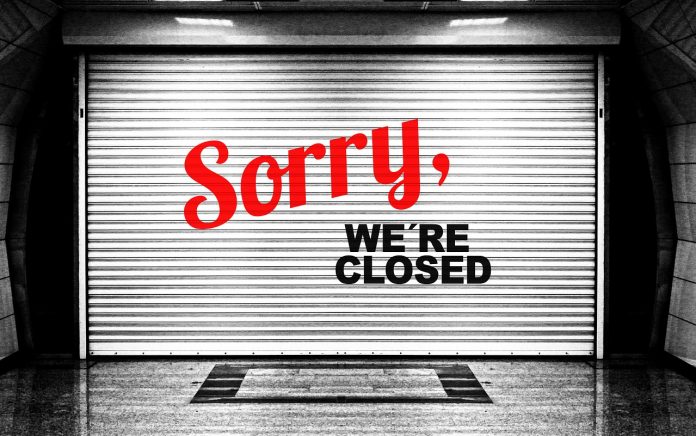Given the success rate of startups, 10%, it’s reasonable to gather why entrepreneurship isn’t a forte many people excel at. But, contrary to what some individuals might perceive, businesses do not crumble overnight or rather suddenly. Instead, it’s a gradual and almost inappreciable process that business owners might fail to notice.
Luckily, there are typical warning signs that any yet-to-be-established venture is on the verge of shutting its doors. A temporary shortage of cash flow or periodic fluctuations in sales might not necessarily indicate a failing setup.
Also, experiencing one or two such signs shouldn’t be an immense cause of alarm. Nevertheless, it would be best to take the appropriate measures to remedy the situation before they scale into irreparable problems. Still, if you recognize several of these warning signs, your startup is definitely going under, and you should consult a professional.
So, what are these signs? Based on the learnings from former flame-outs and after consulting angel investors and successful entrepreneurs, we have prepared this detailed masterpiece highlighting the prevalent signs your business might be sinking.
Top Warning Signs Your Startup May Be Failing
Late Payments of Bills
You can’t elude expenses as you run your startup. From rent, employees, payments to utility companies and suppliers. It’s not unheard of for businesses to occasionally struggle to make these payments. Still, if creditors routinely request payments in the form of baleful letters or emails, it could be a sign of severe cash shortage and, consequently, business failure.
Don’t get it wrong, despite your best efforts you might not be able to pay all your bills on time. And that’s normal. Still, it would be best to communicate to the other party what the problem is, how you solve it, and when you expect to pay. Failing to honor payment agreements with your creditors means your business will become stagnated, less attractive, deep into debts, and eventually bankrupt.
Your Employee Turnover is High
Again, employees leaving an organization is necessarily not a sign that the venture is failing. Even prominent companies lose employees all the time—mainly due to career jumps. Nonetheless, and especially for startups, if the employee turnover is high and recurring, that’s a bad sign for your company’s future.
The founding team for startups plays a critical role in its traction. This is because they are loyal, committed, and importantly, share the same goal as the founders. Therefore, if such employees are constantly leaving, it can affect your startup and remaining employees in many ways. For instance, you will spend a lot of resources trying to replace the lost talent. Not to mention you might be losing effective employees to your competitors.
There could be several reasons why the turnover rate is high. The most prevalent sign being poor staff morale due to low pays, substandard working conditions, or failed management.
You Are Oblivious to Market Forces
Market forces are unpredictable, invincible, and somewhat daunting. Even with an effective strategy, anticipating market forces such as pricing, sales, management, and competition can be overwhelming.
The problem arises when business owners don’t consider market forces. So, if you assume market forces won’t affect your industry or startup, you are also setting up for failure. Extracting insights from direct and indirect factors and significantly, more occasionally improves your startup’s operations in the present and for the future.
You are not taking a Salary from the business
Leave alone your employees receiving late or worse, no salaries at all. If, as a business owner, you haven’t taken a salary for more than a few months, it could be a sign the business is failing.
Lack of Customer Engagement
Needless to say, you should know who your customers are. What we mean is, you should get inside your clientele’s head and figure out their problems, worries, and goals they are pursuing. So, if you can’t lucidly define what your customers want, then your business will ultimately fail.
If your customer base isn’t talking about your startup, whether via social networks, through reviews and referrals, that’s a bad sign for your future.
Also, a solid customer base defines the success of many startups. As a result, you should constantly engage with your clients to understand their pain points. This is one of the most effective strategies to ensure customers don’t lose interest in your products/services.
You Have Reached Your Borrowing Limits
It’s typical for businesses to seek alternative lending options. However, if you find that you have reached your debt ceiling, whether through bank overdrafts or business credit cards, and you can’t access further financing, ask yourself why. Then, instead of giving a lot of thought to how to acquire extra finances, reassess your cash situation and scrutinize whether your startup is in decline.
Entrepreneurs who are unaware of the firm’s financial situation are much likely to hit rock bottom. It will be impractical to understand how much they spend, earn and retain.
You are Holding Too Much Inventory
Yes, your startup’s operation might be effective with minor bumps, but financial constraints could be around the corner if you are holding too much inventory. And worse, it will be a hit you weren’t expecting.
Having excess stock that you do not need weighs down your startups in many perspectives. For example, excess inventory leads to a shortfall in your cash flow, and you will incur extra storage costs, which may lead to stock obsolescence.
You Are Not Generating Any Revenue
Revenue and client satisfaction should be your startup’s primary goals. If you lose sight of money, your business will stagnate. Bear in mind, lack of funds is a significant reason even the most promising and innovative startups shut their doors, especially in their first year. And you can’t always depend on other funding options or getting into debts. Therefore, it’s best to focus on generating revenue and keeping this goal in your sight at all times.
Negligence and stagnation will set your venture for failure. Being cognizant of these top signs your startup may be falling, addressing them, and importantly acting on them will adjust the course of your startup to superior performance and, ultimately, optimal success.












